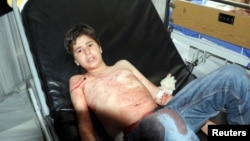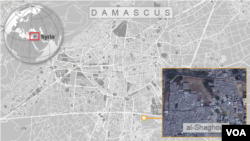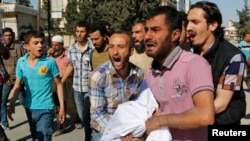At least 50 people have been killed in bomb and mortar attacks in two Syrian cities.
In the besieged city of Homs, two car bombs exploded in a mainly Alawite neighborhood, killing 36 people. An official said Tuesday's bombing also wounded more than 85 people, most of them civilians.
Meanwhile, in the capital, Damascus, mortar shells killed at least 14 people and injured more than 85 others in the al-Shaghour section. Police say some of the shells landed near a religious school and that some of the pupils were among the casualties.
Syria's government blamed the Damascus attack on "terrorists," a term it uses for the rebels fighting to oust President Bashar al-Assad.
Also Tuesday, the Organization for the Prohibition of Chemical Weapons said it will send a team to Syria to investigate recent allegations the the government used chlorine gas in an attack on a rebel area this month.
In a statement, the watchdog said the Syrian government has agreed to the mission, and will provide security in areas under its control.
Meanwhile, Human Rights Watch says government forces have continued to use barrel bombs in the northern city of Aleppo, despite a United Nations Security Council resolution demanding a halt to such attacks.
Barrel bombs
The rights group says that since February, when the council passed the resolution, it has identified the sites of at least 85 bombings in rebel-held parts of Aleppo, with most showing strong signs of impacts left by barrel bombs.
Human Rights Watch is urging the Security Council to impose an arms embargo on the Syrian government and other groups involved in systematic rights abuses.
The group also faults opposition fighters for the use of improvised weapons, saying they are prone to indiscriminate impacts on civilians.
In addition to stopping barrel bombings, the Security Council resolution also demanded that both sides allow aid to reach those in need in Syria. Last week, the heads of U.N. humanitarian agencies said Syria's government and rebels are blocking access to that aid.
Cross-border operations
A group of 35 international lawyers and legal experts said Monday there is "no legal barrier" stopping the U.N. from carrying out cross-border operations into Syria to help the millions of people who need aid.
In a joint letter published by Britain's Guardian newspaper, the group said such deliveries have been held back by "an overly cautious interpretation of international humanitarian law." The experts urge the U.N. to bring aid into Syria, saying Syria's denial of access has been arbitrary and not for valid legal reasons.
The co-signers include Nicolas Bratza, the former president of the European court of human rights, Hans Corell, a former U.N. under-secretary-general for legal affairs, and Richard Goldstone, who was a chief prosecutor for the U.N. criminal tribunals for the former Yugoslavia and Rwanda.
The U.N. says 3.5 million Syrians are in areas that are under siege or where humanitarian assistance cannot reach them.
The fighting that began in March 2011 has displaced at least 6.5 million people within Syria, with another 2.6 million fleeing to neighboring countries. More than 150,000 people have been killed.
In the besieged city of Homs, two car bombs exploded in a mainly Alawite neighborhood, killing 36 people. An official said Tuesday's bombing also wounded more than 85 people, most of them civilians.
Meanwhile, in the capital, Damascus, mortar shells killed at least 14 people and injured more than 85 others in the al-Shaghour section. Police say some of the shells landed near a religious school and that some of the pupils were among the casualties.
Syria's government blamed the Damascus attack on "terrorists," a term it uses for the rebels fighting to oust President Bashar al-Assad.
Also Tuesday, the Organization for the Prohibition of Chemical Weapons said it will send a team to Syria to investigate recent allegations the the government used chlorine gas in an attack on a rebel area this month.
In a statement, the watchdog said the Syrian government has agreed to the mission, and will provide security in areas under its control.
Meanwhile, Human Rights Watch says government forces have continued to use barrel bombs in the northern city of Aleppo, despite a United Nations Security Council resolution demanding a halt to such attacks.
Barrel bombs
The rights group says that since February, when the council passed the resolution, it has identified the sites of at least 85 bombings in rebel-held parts of Aleppo, with most showing strong signs of impacts left by barrel bombs.
Human Rights Watch is urging the Security Council to impose an arms embargo on the Syrian government and other groups involved in systematic rights abuses.
The group also faults opposition fighters for the use of improvised weapons, saying they are prone to indiscriminate impacts on civilians.
In addition to stopping barrel bombings, the Security Council resolution also demanded that both sides allow aid to reach those in need in Syria. Last week, the heads of U.N. humanitarian agencies said Syria's government and rebels are blocking access to that aid.
Cross-border operations
A group of 35 international lawyers and legal experts said Monday there is "no legal barrier" stopping the U.N. from carrying out cross-border operations into Syria to help the millions of people who need aid.
In a joint letter published by Britain's Guardian newspaper, the group said such deliveries have been held back by "an overly cautious interpretation of international humanitarian law." The experts urge the U.N. to bring aid into Syria, saying Syria's denial of access has been arbitrary and not for valid legal reasons.
The co-signers include Nicolas Bratza, the former president of the European court of human rights, Hans Corell, a former U.N. under-secretary-general for legal affairs, and Richard Goldstone, who was a chief prosecutor for the U.N. criminal tribunals for the former Yugoslavia and Rwanda.
The U.N. says 3.5 million Syrians are in areas that are under siege or where humanitarian assistance cannot reach them.
The fighting that began in March 2011 has displaced at least 6.5 million people within Syria, with another 2.6 million fleeing to neighboring countries. More than 150,000 people have been killed.







